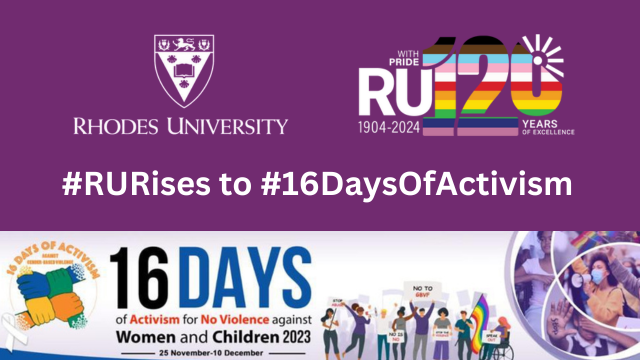By Mo Senne, Senior Communications Officer, Rhodes University
In a world where gender-based violence (GBV) shadows the lives of many, Rhodes University (RU) has stepped into the light, championing change with its #RURises campaign. Coinciding with #16DaysOfActivism, this initiative is a testament to the Institution’s unwavering commitment to tackling GBV head-on, not just in words, but in transformative action.
#RURises, an embodiment of Rhodes University’s stance against GBV, sees the active participation of executive staff, including University leaders and faculty heads. This involvement is crucial, demonstrating that the fight against GBV is not just a student concern but a universal priority.
In recent years, the issue of GBV at Higher Education Institutions (HEIs) in South Africa has gained significant attention. This alarming situation necessitates a focused response to challenge violence against women and girls. The campaign is an opportunity to reflect on the strides made in addressing GBV, particularly in university settings, and to reinforce ongoing efforts to create safer educational environments.
GBV in South African universities – a closer look
The prevalence of GBV in South African universities is a critical concern. Protests and activism around the country since 2016 have brought to light the severity of sexual violence on campuses. While there is increasing awareness, a lack of nationally representative research and the under-reporting of incidents, especially sexual violence, obscure the true extent of GBV in these institutions.
GBV at South African HEIs encompasses various forms, including domestic violence, intimate partner violence, rape, sexual assault, sexual harassment, and homophobic bullying. These forms of violence have profound impacts on the victims, influencing their sense of safety and well-being. For instance, surveys at Rhodes University revealed significant gender differences in perceptions of safety, with a notably higher proportion of female students feeling unsafe on campus, particularly at night.
Rhodes University’s response to GBV has been proactive and multifaceted. Recently, the University organised dialogues exclusively for male students, focusing on the intricacies of GBV. These sessions, facilitated by Dr Gcobani Qambela, a distinguished researcher and Rhodes University alumnus, aimed to raise awareness and strategise early intervention against GBV. Held across various dining halls on campus, the talks provided a safe space for students to explore gender and patriarchy, fostering a culture of open dialogue and introspection. This initiative illustrates Rhodes University’s dedication to creating a more gender-equitable society and promoting safety and respect within its community.
These dialogues are part of a larger initiative to address GBV at Rhodes University. They consist of two phases: an exploration phase, where students discuss gender and patriarchy in a non-judgmental space, and an action plan phase, where students devise strategies to tackle GBV on campus. The initiative reflects the University’s commitment to creating a more gender-equitable society and providing a safe environment for all students.
Vulnerable groups and contributing factors
Younger female students at HEIs are often at increased risk of GBV. The typical student age group of 18–23 years falls within the peak period for both perpetration and victimisation of violence. This vulnerability is exacerbated by the transition to a new and less supervised social environment that university life represents. Additionally, gender-inequitable attitudes and societal norms, such as male superiority and entitlement, play a significant role in the perpetration and normalisation of GBV.
Legislation and policy frameworks
The South African government, recognising the urgency of the situation, has introduced significant legislative reforms. President Cyril Ramaphosa, acknowledging the severity of GBV, signed three key bills into law on 28 January 2022 aimed at bolstering efforts to combat GBV in the country:
- The Criminal Law (Sexual Offences and Related Matters) Amendment Act Amendment Act: This law introduces new offences such as sexual intimidation, expands the National Register for Sex Offenders, and includes additional protections for vulnerable groups, including women under 25 at universities.
- The Criminal and Related Matters Amendment Act: It amends existing laws to further regulate bail, evidence presentation, and the treatment of vulnerable individuals in legal proceedings.
- The Domestic Violence Amendment Act: It broadens the definition of domestic violence and introduces new terms like “controlling behaviour” and “coercive behaviour.” Importantly, it expands the scope of the Act to cover forms of harm occurring through electronic communication, a particularly relevant aspect for university students.
Institutional response and challenges
Institutional and social norms within universities significantly influence the occurrence and reporting of GBV. The lack of clear, comprehensive, and well-implemented policies addressing GBV is a major institutional shortcoming. This deficiency, along with the varied nature of policies across different institutions, contributes to the normalisation of GBV and hinders effective reporting and response mechanisms.
At Rhodes University, all first-time entering students (FTENs) are furnished with a physical copy of the Sexual Offences Policy for Students, which includes contacts and a visual representation of the sexual assault reporting process.
The 16 Days of Activism Campaign against Gender-Based Violence provides a platform to highlight the ongoing struggle against GBV in universities and to call for sustained efforts to address this issue. It is imperative that universities align their policies with the new legislative frameworks and develop comprehensive strategies that address both individual and institutional factors contributing to GBV. This period of activism should serve as a catalyst for renewed commitment and action, ensuring that universities in South Africa are safe spaces for all students, free from the threat of gender-based violence.
This article was first published by Rhodes University Communications.


